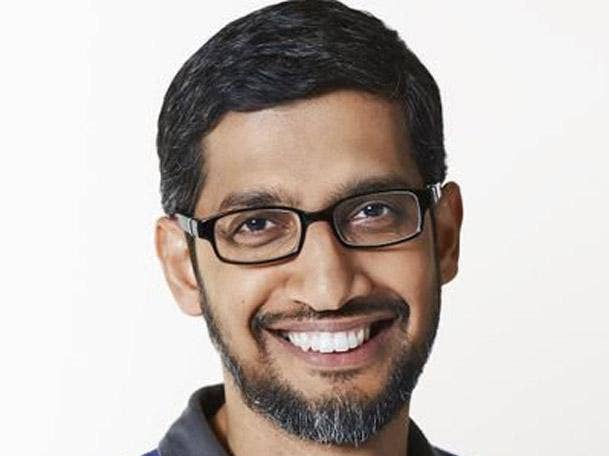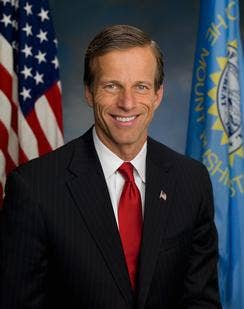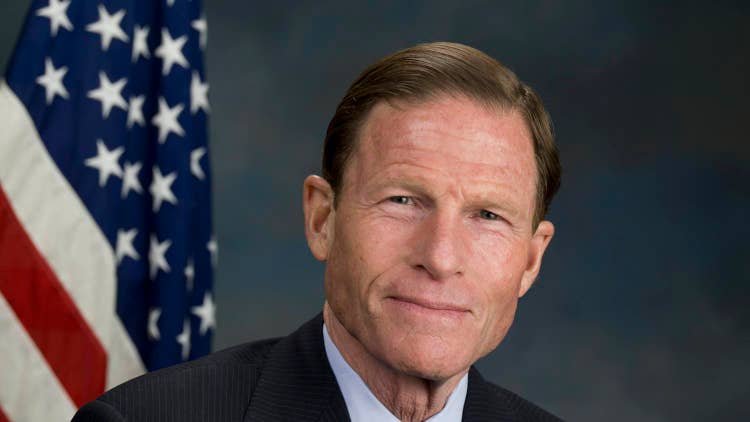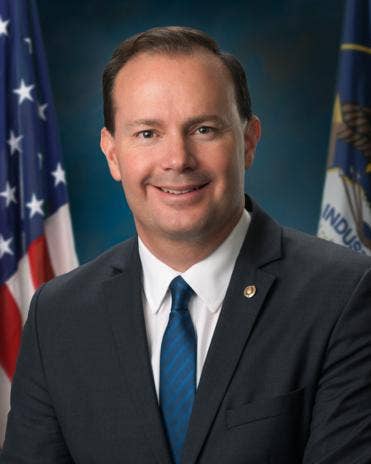Google’s Sundar Pichai’s 9 Biggest Statements At Tech Hearing
‘Let me be clear, we approach our work without political bias -- full stop,’ Alphabet/Google CEO Sundar Pichai said. ‘To do otherwise would be contrary to both our business interests and our mission...”

Section 230 of the federal Communications Decency Act has been “foundational” to U.S. leadership in the technology sector, and federal legislators should carefully consider the consequences that any changes could have on businesses and their customers, according to Alphabet/Google CEO Sundar Pichai.
“Our ability to provide access to a wide range of information is only possible because of existing legal frameworks like Section 230,” Pichai, testifying remotely by video, told members of the U.S. Senate Committee on Commerce, Science and Transportation at a hearing today that also included the CEOs of Facebook and Twitter.
Section 230 of the Communications Decency Act protects online platforms and internet companies such as Google from being liable for material posted by their users. It allows them to, in “good faith,” moderate and remove user-generated content that it considers to be “obscene, lewd, lascivious, filthy, excessively violent, harassing or otherwise objectionable, whether or not such material is constitutionally protected.”
“Let me be clear, we approach our work without political bias -- full stop,” Pichai said. “To do otherwise would be contrary to both our business interests and our mission, which compels us to make information accessible to every type of person, no matter where they live or what they believe.”
“At the end of the day, we all share the same goal: free access to information for everyone and responsible protections for people and their data,” Pichai said.” We support legal frameworks that achieve these goals.”
Senators grilled Pichai, Facebook CEO Mark Zuckerberg and Twitter CEO Jack Dorsey during the hearing, entitled “Does Section 230’s Sweeping Immunity Enable Big Tech Bad Behavior?” Republicans repeatedly alleged the tech giants unfairly censor President Donald J. Trump and other conservative voices – including a disputed New York Post story about Hunter Biden, the son of Democratic presidential nominee Joe Biden – while giving foreign dictators freer rein.
“The three witnesses we have before the committee today collectively pose, I believe, the single greatest threat to free speech in America and the greatest threat we have to free and fair elections,” Sen. Ted Cruz (R-Texas) said.
Democrats, meanwhile, called the hearing a “sham” and politically expedient for grandstanding by their Republican counterparts coming six days for the U.S. presidential election.
“The Republicans have called this hearing in order to support a false narrative fabricated by the president to help his reelection prospects,” Sen. Tammy Baldwin (D-Wisc.) said. “The tech companies here today need to take more action, not less, to combat misinformation, including misinformation on the election, misinformation on the COVID-19 pandemic and misinformation and posts meant to incite violence. And that should include misinformation spread by President Trump on their platforms.”
Pichai fielded far fewer questions from senators than the Facebook and Twitter CEOs. Here’s a look at the rest of Pichai’s opening remarks and some of his exchanges with the committee members.

‘Powerful Force For Good”
The internet has been a “powerful force for good” for the past three decades, Pichai said in his opening remarks.
“It has radically improved access to information, whether it‘s connecting Americans to jobs, getting critical updates to people in times of crisis or helping a parent find answers to questions like how can I get my baby to sleep through the night,” he said. “At the same time, people everywhere can use their voices to share new perspectives, express themselves and reach broader audiences than never before. Whether you’re a barber in Mississippi or home renovator in Indiana, you can share a video and build a global fan base and a successful business right from your living room. In this way, the internet has been one of the world’s most important equalizers.”
“Information can be shared, and knowledge can flow, from anyone to anywhere,” Pichai said, adding that the same low barriers to entry also make it possible for “bad actors to cause harm.”
“As a company whose mission is to organize the world‘s information and make it universally accessible and useful, Google is deeply conscious of both the opportunities and risks the internet creates,” he said.

Google’s Value To The Average American
Pichai said he’s proud that Google services include Search, Gmail, Maps and Photos provide “thousands of dollars a year in value to the average American for free.”
“We feel a deep responsibility to keep the people who use our products safe and secure and have long-invested in innovative tools to prevent abuse of our services,” he said.
When it comes to privacy, Google is committed to keeping users’ information safe, treating it responsibly and putting users in control, according to Pichai.
“We continue to make privacy improvements like the changes I announced earlier this year to give less data by default, and support the creation of comprehensive federal privacy laws,” he said.

‘Non-Partisan’ Support Of U.S. Democracy
Google also is committed to protecting the quality and integrity of information on its platforms and “supporting our democracy in a non-partisan way,” Pichai said, citing information panels on Google and its YouTube video-sharing platform that inform users about how to register to vote and where to cast ballots.
“We‘ve also taken many steps to raise up high-quality journalism, from sending 24 billion visits to news websites globally every month, to our recent $1 billion investment in partnerships with news publishers,” Pichai said, referring to Google’s announcement this month that it will make an initial $1 billion investment to pay publishers to create and curate high-quality content for a new Google News Showcase product.

Creating Products For People Of All Viewpoints
“Since our founding, we‘ve been deeply committed to the freedom of expression,” Pichai said. “We also feel a responsibility to protect people who use our products from harmful content and to be transparent about how we do that. That’s why we set and publicly disclose clear guidelines for our products and platforms, which we enforce impartially.”
Google recognizes that people who uses its services have a broad spectrum of perspectives, and it’s dedicated to building products that are helpful to users of “all backgrounds and viewpoints,” according to Pichai.
“Let me be clear, we approach our work without political bias -- full stop,”
Pichai stressed. “To do otherwise would be contrary to both our business interests and our mission, which compels us to make information accessible to every type of person, no matter where they live or what they believe.”

Klobuchar Attacks Pichai’s Response To Antitrust Lawsuit
Sen. Amy Klobuchar (D-Minn.), a ranking member of the Subcommittee on Antitrust, Competition Policy and Consumer Rights, criticized Pichai’s defense of a U.S. Department of Justice lawsuit and 11 states filed against Google for alleged monopolization of online search markets.
“I have not really liked your response to the lawsuit and what‘s been happening,” Klobuchar said. “I think we need a change in competition policy for this country. And I think your response isn’t just defensive, it’s been defiant to the Justice Department and suits all over the world. You control almost 90 percent of all general search engine queries, 70 percent of the search advertising market. Don‘t you see these practices as anti-competitive?
Pichai responded that Google is a “popular” general-purpose search engine.
“We do see robust competition in many categories of information,” Pichai said. “And, we invest significantly in R&D (research and development). We are innovating. We are lowering prices in all the markets we are operating in.”

Thune Questions Google Workforce’s Political Bent
Sen. John Thune (R-S.D.) suggested that a lack of “ideological diversity” among the tech companies’ executives and other employees – whom he alleged are Democratic-leaning – is contributing to distrust among their Republican and conservative platform users.
“There are people who are liberal, Republican, libertarian and so on,” Pichai said in describing Google’s workforce. “We consult widely with important third-party organizations across both sides when we develop our policies. As a CEO, I‘m committed to running it without any political bias.”

Election Results Planning
Sen. Richard Blumenthal (D-Conn.) questioned the tech CEOs about having plans in place to address parties that may use their platforms on election day to claim, without evidence, that the results were fraudulent or to prematurely claim that the election and the counting of votes must stop.
“Yes...we‘ve been planning for a while,” Pichai said. “We rely on raising up news sources through moments like that, as well as being closely partnered with Associated Press to make sure we can provide users the most accurate information possible.”

Election Meddling
Sen. Tom Udall (D-N.M.) asked Pichai to describe what Google is seeing in terms of other nations attempting to use its platforms to spread misinformation and influence the 2020 election.
“We do continue to see coordinated influence operation attempts,” Pichai said. “We‘ve been very vigilant. We appreciate the cooperation we get from intelligence agencies, and as companies we are sharing information. We publish transparency reports. In June we identified efforts, one from Iran…targeting the Trump campaign, one from China…targeting the Biden campaign. Most of these were phishing attempts. Our spam filters were able to remove most of the emails out from reaching users, but we notified intelligence agencies. It’s an area where we would need strong cooperation with government agencies moving forward.”

‘We Don’t Censor’
Sen. Mike Lee (R-Utah) asked the tech CEOs to identify one high-profile person or entity with a liberal ideology that their platforms have “censored” and what action they took.
“We don‘t censor, we have moderation policies which we apply equally,” Pichai responded. “We have turned down ads from Priorities USA (a liberal political action committee), from Vice President Biden’s campaign. We have had compliance issues with World Socialist Review, which is a left-leaning publication.”
Pichai also cited Google’s graphic content policy.
“We don‘t allow ads which show graphic violent content…and we have taken down ads on both sides of the campaign,” Pichai said.